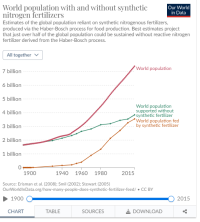This is getting embarrassing now:
Vegetarians can get some choline in eggs and milk products. And there are several plant-based, vegan sources of choline, including legumes, tofu, green vegetables, potatoes, nuts, seeds, grains, and fruit—all of which contain some amounts of choline.
How much choline should you get if you eat a vegetarian or vegan diet? Here's how to get Choline on a Vegetarian and Vegan Meal Plan.

sharonpalmer.com
Vegan Foods High in Choline
1. Soybeans: 107 mg, 19% DV
The best vegan source of choline, roasted soybeans contain 107 milligrams in each 1/2-cup serving, according to the NIH. That's equal to 19 percent of the daily value for people AMAB and 25 percent for people AFAB. If you prefer your soy in tofu form, a 1/2 cup of extra-firm tofu contains 33 milligrams of choline, according to the
USDA.
2. Red Potatoes: 57 mg, 10% DV
Next on the list of plant-based sources of choline is red potatoes, which serve up 57 milligrams in each large cooked potato. Russet potatoes have almost as much, coming in with 45 milligrams of choline per large, cooked potato, according to the
USDA.
Although potatoes are sometimes villainized as the least nutritious of all the vegetables, it's easy to incorporate them into your diet healthfully with these
potato recipes.
3. Wheat Germ: 51 mg, 9% DV
Whole grains are tops in nutrition, and that includes wheat germ, which is an excellent source of thiamin and a good source of folate, magnesium, phosphorus and zinc, according to the
Mayo Clinic. Sprinkle 1 tablespoon of toasted wheat germ over hot or cold cereal, and you'll get 51 milligrams of choline in your diet.
4. Kidney Beans: 45 mg, 8% DV
If you're looking for a vegan source of nutrition, you can't go wrong with beans. Canned kidney beans, in particular, have 45 milligrams of choline per 1/2-cup serving.
Other beans can add a bit of choline to your diet, too —
black beans and
garbanzo beans both offer about the same.
5. Quinoa: 43 mg, 8% DV
Let's go back to those whole grains — quinoa is not only an excellent source of complete, plant-based protein, but it also contains 43 milligrams per 1-cup serving cooked. You can eat the grain for any meal of the day with these
quinoa recipes.
6. Brussels Sprouts: 32 mg, 6% DV
You either love them or you hate them, but there's no denying that Brussels sprouts are a great vegan source of choline. Each 1/2 cup serving of boiled and chopped Brussels sprouts has 32 milligrams of the nutrient.
7. Broccoli: 31 mg, 6% DV
Broccoli is a powerhouse in terms of nutrition, and each 1/2 cup of cooked, chopped broccoli contains 31 milligrams of choline. If you have leftover cooked broccoli, try out a recipe for
Broccoli Hash with Eggs or combine it with cauliflower for
Creamy Broccoli and Cauliflower Soup.
8. Shiitake Mushrooms: 27 mg, 5% DV
Mushrooms provide all the umami of meat while being plant-based. Out of all of the varieties, shiitake mushrooms are the highest in choline. A 1/2 cup of cooked shiitake mushroom pieces serves up 27 milligrams of the nutrient.
9. Peanuts: 24 mg, 4% DV
A family favorite — as long as there aren't any allergies — peanuts provide 24 milligrams of choline per 1/4 cup serving. Peanut butter has nearly as much, containing 21 milligrams in every 2 tablespoons, according to the
USDA. You don't need to stick to sandwiches, though — try out a
peanut butter recipe that doesn't require bread.
Foods high in choline include beef and liver, eggs, soybeans, chicken, cod, peanuts, potatoes and more. Check out the foods high in choline chart for more.

www.livestrong.com

www.pcrm.org













